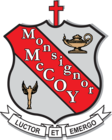In Catholic high schools, there are many opportunities for integrating gospel values and nurturing the presence of God in our midst within the curriculum. Teachers will determine where religious values and church teaching can be integrated within each course. Religious education is an essential and integral part of the life and culture of a Catholic school.
Through it, students are invited to develop the knowledge, beliefs, skills, values and attitudes needed to build a relationship with God and community through the person of Jesus Christ. Religious education shares the same goals and objectives set forth for all good education; that is, the growth and development of the whole person in all his or her dimensions—physical, intellectual, emotional, social and spiritual.
Religious education has four essential characteristics:
- It is Trinitarian. It recognizes God as the creator of all things who gives us Jesus. It is Jesus who reveals God to us, and in turn reveals God’s Spirit, through whom we understand our faith.
- It is based on Sacred Scripture through which we hear the mystery of God revealed, the call to be in relationship with God and each other, and we learn how to pray.
- It is based on the life experience of the students through which they are invited to discern signs of God in their daily lives.
- It is presented within the tradition of the Catholic faith community which, based on Church teachings, sacramental and liturgical life, provides students with experiences of faith, prayer, love and justice.
Students must be registered in and receive 3 credits in Religion for each year at Monsignor McCoy High School. Successful completion of all Religion Courses is required in order to participate in graduation ceremonies.
